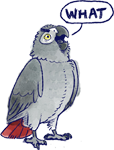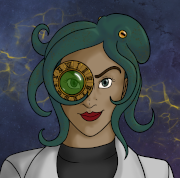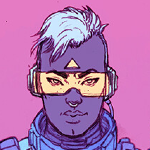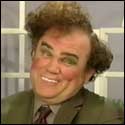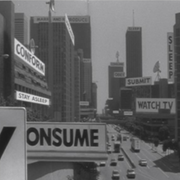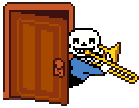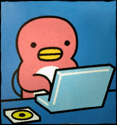|
Sorry I mean, what books should I read in the spy thriller/noir genre. i don't know whats good and/or exemplifies the themes there well. I could just pick books at random but I'd rather have somebody point to something fun. I got about 2k good words down so far, paragraph 1 is a dude dying with a dagger in his chest as the protag suddenly confronts the emotions she feels for finally executing her first assassination and how she feels better than she thought and simultaneously feels really bad about that. It works and it'll work even better with more context later, but I'm really happy with it. It's a fantasy setting too so I'm also having fun trying to think up dumb spy gadgets but replace technology with magic. But really I was just looking for book recommendations. Which I suppose there is probably a better thread to ask...
|
|
|
|

|
| # ? May 9, 2024 19:52 |
|
Agent355 posted:Sorry I mean, what books should I read in the spy thriller/noir genre. i don't know whats good and/or exemplifies the themes there well. I could just pick books at random but I'd rather have somebody point to something fun. Le Carre (Spy who came in from the cold, little drummer girl) and Eric Ambler are both vg.
|
|
|
|
Agent355 posted:Sorry I mean, what books should I read in the spy thriller/noir genre. i don't know whats good and/or exemplifies the themes there well. I could just pick books at random but I'd rather have somebody point to something fun. Charles Stross's Laundry books, especially the first few, may be close enough to be of some help to you. (It's cosmic horror rather than fantasy for the genre, but it's still about an inexperienced person thrust into genre-flavored spy business, with a humorous tone.) And Tim Power's Declare is a must for genre+spies in general. Other than that, can't think of anything written that really hits the 'newbie/unwilling spy over their head' spot. That shows up a lot more in other media, from Hitchcock to Chuck...
|
|
|
|
Thanks, picked up one each from the four authors posted, will likely finish these in a couple weeks and grab more.
|
|
|
|
Anybody got any favourite/preferred outlining methods? I used to be big on discovery writing until I made a huge mess of a first draft and used outlines to dig around and figure out what I was trying to do with the story. But until today I've never started a project by specifically trying to outline before writing at least 20-30k words (which usually end up trashed fast because I'm just stumbling around). I'm trying to outline first this time, and it's unexplored territory for me.
|
|
|
|
Hungry posted:Anybody got any favourite/preferred outlining methods?  Not on the wall yet:  I'm uh... Maybe not the best person to take advice from on this subject. I may have written more on outlining ideas in one of the first posts, but I forget. Dr. Kloctopussy fucked around with this message at 20:32 on Jul 27, 2017 |
|
|
|
Hungry posted:Anybody got any favourite/preferred outlining methods? i mean this really depends on the person and you kinda have to figure out what methods work for you this lecture might be useful: https://www.youtube.com/watch?v=tI2UsHU4Htk in general, figure out your ending asap so you know where you're going to land. if you have to change your ending after figuring out your characters, thats ok, but don't start filling out lesser details until you know your ending. after you have your beginning concept and ending, fill in the middle from there. my method is pretty in the middle and may be useful for you: figure out core hook or interesting things you want to do figure out character motivations (these can change, but i wouldn't really gently caress around with major protagonist motivations once you have something solid that ties into the ending) figure out ending fill in a few huge chunks from there (separate your book into 4ish pieces) state your goals for each chunk; for example, mention "three instances of character growth towards this direction" in chunk 3 so the finale feels like the character has made a meaningful change. figure out a theme; this is sort of your problem solving device, try and tie it to as many characters as possible. is a scene not accomplishing much but necessary for some reason? relate it to a theme. once i have that, i just start writing and problem solve anything that sucks from there. for each scene, before i write i take at least two goals from the chunk pile and make a conscious effort to include them in the scene i write. anime was right fucked around with this message at 20:27 on Jul 27, 2017 |
|
|
|
Agreeing that everyone is going to have a different style that works for the. I'm generally fairly light on outlines, but what I do generally is 1. Come up with several cool moments that I want the story to hit (this usually includes an ending scene and a setting that grows out of those moments) 2. Come up with a core of characters who are interesting in some way 3. Figure out where to begin (hook) 4. Write a general progression of major story events in an ordered list that links together the big moments 5. Start writing from the beginning, but also write pieces of the cool moments that will give me either something to include later or a basis for when I rewrite that section as I reach it 6. Update and change my outline, including key events, as I write and my discovery process shapes and changes things later on so that I still know where I'm going For shorter stuff (less than 10k words), I generally don't change the outline because the story doesn't deviate from it all that much. If it's a longer piece, I've usually already thought about the story a lot by the time I decide to write it. The hardest part is linking the climactic scenes and setting up the emotional moments so they resonate the way I want them to (so, writing the middles).
|
|
|
|
outlining always makes me lock up and I can never think of something to write down for "conflict 1/2" then I try to just write a summary this does not work either, I scribble swirls while unable to think of anything gently caress outlines
|
|
|
|
sebmojo posted:Le Carre (Spy who came in from the cold, little drummer girl) and Eric Ambler are both vg. Want to be more specific here and say "pre-war Eric Ambler", because man do his books go to poo poo after the war. Also, The Day of the Jackal is a masterpiece in many ways, one being that you already know the ending of the story right from the start and yet you don't care one single bit. I'd highly recommend it for anyone interested in the genre.
|
|
|
|
I use a personalized version of the snowflake method, basically. I, too, have fallen into the despair inducing trap of going into a novel with a only vague idea of what I wanted the plot to look like. I was resistant to outlining because it's harder for me to "see" the events of my story if I'm not thinking about how to put them directly into prose. Starting with broad strokes and working my way down to individual scenes took away some of the intimidation factor. There is still an exploratory element to outlining. I recently hit a point in my novel where I decided to add a significant plot element, meaning I need to go back and revise my outline. But now I have an even better idea of how each scene will play out.
|
|
|
|
Xotl posted:Want to be more specific here and say "pre-war Eric Ambler", because man do his books go to poo poo after the war. I've only actually read one Ambler but I liked it (Send No More Roses).
|
|
|
|
Thanks for all the answers, that was really helpful.anime was right posted:
Especially this, a few things he said really struck a chord with me. That thing about discovery writers being too much about the questions and not enough about the answers, that's an issue I've been working against for some time, and it's great to see it's actually a thing and not just in my head.
|
|
|
|
sebmojo posted:I've only actually read one Ambler but I liked it (Send No More Roses). I've actually never read that one. What the hell: I'll give it a shot. Thanks.
|
|
|
|
Are there any worthwhile online courses for novel writing, paid or otherwise? I've never had anything like a writing class, outside of the standard ones required as part of education curriculum, and I wouldn't mind having a class that maybe results in me stumbling around blindly a little less.
|
|
|
|
|
MockingQuantum posted:Are there any worthwhile online courses for novel writing, paid or otherwise? I've never had anything like a writing class, outside of the standard ones required as part of education curriculum, and I wouldn't mind having a class that maybe results in me stumbling around blindly a little less. I'm not sure about online courses for this but the Elements of Fiction Writing book series came as close to textbooks for me--not that I'm accomplished or anything, but they seemed very genuine and well-rooted.
|
|
|
|
MockingQuantum posted:Are there any worthwhile online courses for novel writing, paid or otherwise? I've never had anything like a writing class, outside of the standard ones required as part of education curriculum, and I wouldn't mind having a class that maybe results in me stumbling around blindly a little less. The Writing Excuses podcast, run by a bunch of published authors, dedicated season 10 to specifically going through putting together a novel. Depending on where you are, you can skip around on episodes. Each episode is really short (~15 minutes). You can also scan the other seasons for specific topics you're looking for. Just make sure to actually try out some of the exercises, because that's the part that's actually going to make you a better writer.
|
|
|
|
MockingQuantum posted:Are there any worthwhile online courses for novel writing, paid or otherwise? I've never had anything like a writing class, outside of the standard ones required as part of education curriculum, and I wouldn't mind having a class that maybe results in me stumbling around blindly a little less. Brandon Sanderson's lectures from his fiction writing class at BYU are online for free. A few of us here watched the earlier videos way back in 2013 and found them useful at the very least to the extent that they motivated us to try and write novels. I found them helpful in terms of content as well. (I think some of the other people also did, but i will refrain from speaking for them). More recent, and better quality videos are now available on youtube. I haven't watched these exact videos, but presumably they are very similar to the ones I have, and I liked those, so maybe these will also be good! There is a link to the youtubes here: https://brandonsanderson.com/2016-sanderson-lectures/ I'm not linking directly b/c youtube is being loving weird as broken hell for me at the moment. p.s. we should definitely be calling him Brandy Sandy, right??? Dr. Kloctopussy fucked around with this message at 11:17 on Aug 6, 2017 |
|
|
|
Dr. Kloctopussy posted:p.s. we should definitely be calling him Brandy Sandy, right??? BRANDY. SANDY.
|
|
|
|
i call him branderson sanderson because anything else is like a melody that doesn't resolve
|
|
|
|
MockingQuantum posted:Are there any worthwhile online courses for novel writing, paid or otherwise? I've never had anything like a writing class, outside of the standard ones required as part of education curriculum, and I wouldn't mind having a class that maybe results in me stumbling around blindly a little less. While I defiantly turn my nose up to any formal education in the pursuit of creativity, my father took a creative writing class at our state college about five years ago. He loved it, and he finished his book. In fact his completion is what convinced me I could write a book it's gotta be easy right?
|
|
|
|
Thanks for all the suggestions, goon friends. I'm watching the Brandy Sandy lectures right now and they're really helping to clarify some things. Also reading through Story Engineering by Larry Brooks, and while he tends to put things a little too prescriptively for me, I think there's a lot of value I can take away from it. Question regarding discovery(pantsing) vs outlining writing styles: I'm trying to write my first book, after a couple of false starts with NaNoWriMo and a self-imposed second attempt at a novel in a month. I'm still unsure whether I would really fall in the camp of discovery writing or more strict outlining. I think I'll most likely settle somewhere in the middle, but is there a value, as a newish writer, for just going wholeheartedly at one approach or the other and seeing where it gets me? In the past I've been pretty successful, as far as word count and getting ideas on the page is concerned, by just writing and not worrying about it too much, but both of my aborted attempts were largely because I hit a point where the story just got totally lost and the easiest fix will be starting over on both of those attempts.
|
|
|
|
|
I'm a discovery writer and I got stalled halfway through two books so far. I'd take one of your half books and try the snow flake method on it.
|
|
|
sebmojo posted:I'm a discovery writer and I got stalled halfway through two books so far. I'd take one of your half books and try the snow flake method on it. Yeah I was peeking at that when someone linked it above. I think it'll at least help clarify where the book feels like it should go. So far what feels most natural to me is to just sit down and write, honestly. I very pointedly don't go back and rewrite stuff as I'm going though-- I feel like it makes more sense to just get to the end of a first draft, and jot down notes on the way if I realize I could make changes in past chapters that would help or whatever. I also don't feel that natural outlining at all, but I do find very early on I get a sense of how I want the book to end, and major events that need to happen over the course. Sometimes it feels pretty apparent what order they should happen in, and then the writing mostly becomes about orienteering myself towards the next natural "plot point". Regardless, I've found in the past when I do outline stuff, the characters end up wooden and perfunctory. For all their faults, the characters in my two book-a-month attempts feel much more natural.
|
|
|
|
|
The biggest roadblock that I have is "oh, god, this is dumb." I'll really give a poo poo about a concept but putting it into action makes it real but makes it feel dumb--which it should since it's a first draft--but it demotivates me. It's the same way for visual art that I make, which comes comparatively easier to me. I make a painting and I know people legitimately like it but all I can see are flaws. Nonetheless, I've been in a few small art shows and have made a nice amount of cash from my art, but I don't believe in myself for whatever dumb reason. Still, and I can't fully realize this despite being cognizant of it: when I see flaws in other people's art/stories I'm fine with them and even easily appreciate them. In relation to the post above, I want to be pantsy but feel that it isn't enough planning and I want to be outliney but feel that it's too formal. The Sean fucked around with this message at 01:57 on Aug 8, 2017 |
|
|
|
Make more art.
|
|
|
|
The biggest danger with pantsing is getting lost in the weeds and eventually ending up with the literary equivalent of a wet fart. The biggest danger with planning is having to wrench the story back into place when you feel it start to take on a life of its own. I've never been a meticulous planner, with dozens of 3x5 cards pinned to the wall or whatever. The writers I've known who are tend to write stories I would characterize as "formulaic." Which is fine! Nothing wrong with formula writing, there's certainly an audience for it. Just be aware that you have to work harder at making your preset plot points flow organically, rather than "MUST HAVE SHEILA'S SUICIDE HERE (even though she's actually pretty happy right now)." Thing is, writing a book is sort of like filming a movie. Sometimes, the actors do something that makes you go "Whoa, that's not the story I was telling, but in its way it's much better." Then you have to decide, do you keep that flash of brilliance and change everything that comes after (and sometimes before), or discard it and stay on your path to a particular ending? What's more important, the story you're telling, or the story you could be telling? I tend to chase rabbits, so plotting too much ahead of time tends to be a waste of time. That may not be your thing.
|
|
|
|
For me, the whole point of index cards (post-its) on the wall is so I CAN explore multiple possibilities easily, while still keeping track of the overall structure and story. I have multiple possible, sometimes contradictory, plot lines/scenes that can be stacked up and viewed all at once to evaluate. It's easy to stick new ideas in and take old ones out, or rearrange them, or put an old one back in again. I just make new post-its for every thing that comes up while I'm writing, and then see how it fits. What would need to change if this is what happened? Generate a bunch of new post-its for that. Indented outlines on a page freeze me up like nothing else, but if I "just write," I end up with a mess that requires a bunch of cleaning up afterwards.... And that clean up involves doing exactly what I do with the post-its. Deciding what fits together best and how, then filling in the gaps.
|
|
|
Dr. Kloctopussy posted:For me, the whole point of index cards (post-its) on the wall is so I CAN explore multiple possibilities easily, while still keeping track of the overall structure and story. I have multiple possible, sometimes contradictory, plot lines/scenes that can be stacked up and viewed all at once to evaluate. It's easy to stick new ideas in and take old ones out, or rearrange them, or put an old one back in again. I'm really starting to understand what you mean about that last point. I can't do written outlines, but something akin to shifting around notecards or post-its does make a lot of sense to me. I know this is getting a little navel-gaze-y, but I think it does come down to a lot more than "are you a pantser or a plotter." The more I write, the more I'm finding it's not a continuum with those two options at the extremes, it's much more personal. I've overthought the question for a long time and what I'm coming to is a conviction that you're best off just trying whatever works, be it a mess of post it notes or mailing yourself plot points or asking your dog for advice. Do it til it doesn't work, then find something else. Temper that with intentional work on areas where you don't do well and I think it'll keep you propelled through a lot of writing. I write god-awful dialogue and I hate reading about writing dialogue but every time I do, I can see some improvement, even if it's kind of marginal.
|
|
|
|
|
also dont forget there are pretty good odds that no matter what method you use you're just going to suck at writing long stories until you do it a few times and learn from your mistakes part of writing a few books isnt just to get a lot of words on the page, its to learn your methods and how to plan better, course correct, and know what methods work best for you.
|
|
|
anime was right posted:also dont forget there are pretty good odds that no matter what method you use you're just going to suck at writing long stories until you do it a few times and learn from your mistakes Oh definitely. I'm maybe a quarter of the way through my third attempt at a novel, and there's a lot that I'm not happy about. There's also a lot I'm actually pretty excited about. But it's all terrible writing. I think I'm past the point where i'll chuck it and try something else, though-- even if I finish this book and don't feel like it's good enough to be marketable, I think there's a ton of value in finishing it. And even if it's not great, I think I may go through the process of editing it and maybe workshopping it too. As a novice writer it's hard for me to envision the benefits and lessons to be gained from the editing process, and I think I need to go through it pretty rigorously once before I can confidently tell myself "yeah this passage I'm writing sucks now, but I know I can fix it later."
|
|
|
|
|
So, I'm working on my first prose novel. I've written a few graphic novel scripts, and loads of comic scripts at this point, but this is my first full on novel, novel. It's been going extremely smoothly I'm fairly happy to say. I started on it from scratch a little over two weeks ago- the Thursday after last, and I'd wager I'm about half way done, some 51,000 words or so. I'm hopeful that I'll get this done maybe a little bit after the end of the month and then the editing can start. What I'm curious about is, what are the benefits or issues with using CreateSpace to self publish? https://www.createspace.com/ It seems like a really good deal to go with, but I'm not sure if there's some hidden fees. I'm also curious if you can include illustrations within the pages of the book using it. Worst comes to worst, I can always just use Kindle directly, and I was planning on doing both from the get go. Have the physical copy from Createspace be about 13 dollars, while the Kindle version is 6, for those that really want a physical copy.
|
|
|
|
I use draft2digital to get a tidy print on demand vs using createspaxe directly since I remember it being really annoying to manage with how much busywork poo poo you had to do. Doesn't really cost you anything, they take like 10% maybe. Definitely an avenue to look at. D2d will also [Can also] handle digital distribution to nearly every digital store aside from Amazon (cause some banned authors were abusing it to bypass it or something) but you can still have D2D generate a super super crisp and clean mobi to upload to Amazon (which is nice since a lotta other places only need epubs so its generous if D2d to still offer it, IMO)
|
|
|
|
Ask in the self-publishing thread, too. People in there have lots of experience, and I don't know how many of them read this thread. I think I remember someone saying in there that they greatly preferred Amazon's print on demand to createspace, but I could be totally wrong.
|
|
|
|
Dr. Kloctopussy posted:Ask in the self-publishing thread, too. People in there have lots of experience, and I don't know how many of them read this thread. Amazon's pod is createspace, isn't it?
|
|
|
|
That's a good reason why to ask in the self-pub thread!
|
|
|
|
So I've successfully been writing a minimum of 1500 words a day, every day, for a few weeks. And the conclusion I've come to is... dear lord my writing sucks, Gonna just keep powering forward and finish something that vaguely resembles a book, though, cuz like we discussed above, it is seriously teaching me a lot about how to approach the next one. Interestingly, it's also teaching me a ton about what I need to look for when I'm reading. I've kind of developed a big mental laundry list of stuff to check out in books that I really enjoy in terms of how they approach dialogue, action, structure, voice, etc.
|
|
|
|
|
I have some severe ADHD and no medication because yay healthcare, so I can NEVER tell you how much I'm going to write per day. Some days its a total goose egg. Some days it's some 3000 words. Maybe more. Across two weeks and three days, I've written 59000 words. So woo me My goal is to get the first draft of my book done by the end of the month if at all possible
|
|
|
|
MockingQuantum posted:Are there any worthwhile online courses for novel writing, paid or otherwise? I've never had anything like a writing class, outside of the standard ones required as part of education curriculum, and I wouldn't mind having a class that maybe results in me stumbling around blindly a little less. This just popped up on lifehacker today. Maybe worth investigation. Get a Head Start on NaNoWriMo With These Creative Writing Courses http://lifehacker.com/get-a-head-start-on-nanowrimo-with-these-creative-writi-1797861082
|
|
|
|

|
| # ? May 9, 2024 19:52 |
|
I got 94k into my sixth (!!! how the gently caress did this happen?) novel and....I hate it and don't want to write it anymore. First time this has happened. With my previous five it was a mostly straight forward experience except for y'know the imposter syndrome but this time just...ugh. I'm wondering if I should just power through and finish it, since after this next chapter it's the home stretch onto the final act (so probably another 20k) or just shelve it for now and work on something else. Writing is hard guys 
|
|
|



